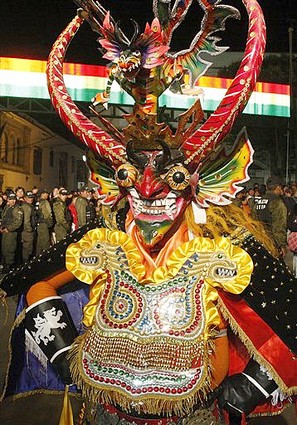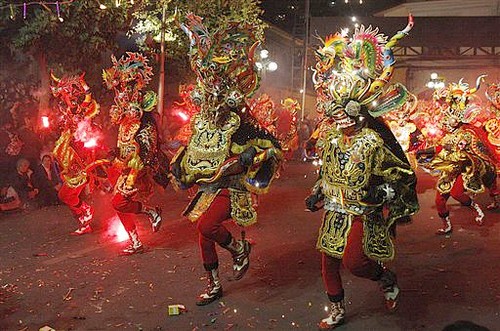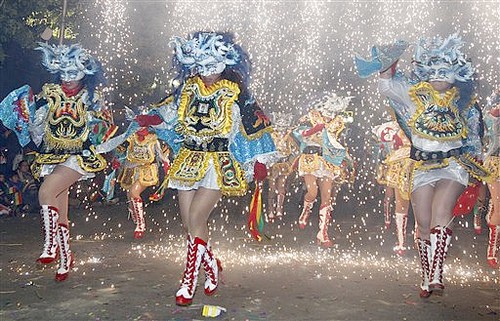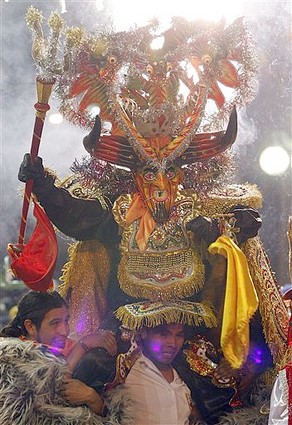
(left) A man dressed as devil dances to celebrate the "Day to demand the Bolivian origin of the Diablada dance" in La Paz, Thursday, August 20, 2009. Bolivia has issued a formal complaint on the origin of the traditional dress the Peruvian candidate for Miss Universe is wearing during the contest: a Diablada costume. Bolivia claims the origin of the Diablada dance while Peru's Foreign Minister said last week that the highlands culture is only one and that the Diablada is a dance from colonial times, when Peru and Bolivia were not yet states.
(AP Photo/ Juan Karita) (Juan Karita, AP / August 20, 2009)
In a devil of a diplomatic dispute, rivalry between Peru and Bolivia hits the dance floor
August 22, 2009 - Los Angeles Times
LIMA, Peru (AP) — A beauty pageant has set off a beastly battle between Peru and Bolivia, which both claim ownership of the Andean "Devil's Dance."
The Peruvian contender for Miss Universe, Karen Schwarz, set off the feud when she donned a wildly ornate dress, boots and cape — accompanied by a multicolored, horned headpiece — as a symbol of the dance allegedly native to her country.
Bolivia immediately cried fraud.
"The devil has his home" in Bolivia's high-plains city of Oruro, said Bolivian Foreign Minister David Choquehuanca. His government began running ads on regionwide television network Telesur and CNN en Espanol staking Bolivia's claim to the dance and has threatened to take the dispute to an international tribunal at the Hague.
And on Thursday night, hundreds of Bolivian dancers and musicians bedecked in the devilish attire swirled fiendishly around La Paz's central Murillo Square for more than three hours.
Last week, a team of Peruvian congressmen stumped through a comparatively shaky performance of the whirling jig in front of Congress.
(below) Men dressed as devils dance to celebrate the "Day to demand the Bolivian origin of the Diablada dance" in La Paz, Thursday, August 20, 2009. Bolivia has issued a formal complaint on the origin of the traditional dress the Peruvian candidate for Miss Universe is wearing during the contest: a Diablada costum. Bolivia claims the origin of the Diablada dance while Peru's Foreign Minister said last week that the highlands culture is only one and that the Diablada is a dance from colonial times, when Peru and Bolivia were not yet states. (AP Photo/ Juan Karita)

Congressman Johnny Lescano, from the Puno province bordering Bolivia, called Bolivia's claims "disoriented." The dance "was initially established ... in Puno and first danced in the mines of Laycacota in 1583," Lescano said.
The Peruvian National Culture Institute was more diplomatic: Director Cecilia Bakula says the dance is not only Bolivian and Peruvian, but Chilean as well.
The dance "represents the battle between the archangel and the seven deadly sins represented by the devil," Bakula said.
"So it's not as ancient as they say; it dates to colonial times."
Such prickly nationalistic spats are characteristic of the Andean region, where modern nation-states share a common cultural history. For its part, Peru has mounted an international campaign against Chile's claim over a fiery grape brandy called pisco and Chile's contention that 99 percent of the world's potatoes derive from its spuds.
(below) Women dressed as devils dance to celebrate the "Day to demand the Bolivian origin of the Diablada dance" in La Paz, Thursday, August 20, 2009. Bolivia has issued a formal complaint on the origin of the traditional dress the Peruvian candidate for Miss Universe is wearing during the contest: a Diablada costume. Bolivia claims the origin of the Diablada dance while Peru's Foreign Minister said last week that the highlands culture is only one and that the Diablada is a dance from colonial times, when Peru and Bolivia were not yet states. (AP Photo/ Juan Karita)

But Peru's relations with Bolivia have traditionally been amicable — at heart, they've got more in common than not. They share Lake Titicaca, believed to be the birthplace of the Incas, whose Peruvian-based empire stretched from Colombia to Argentina. And Bolivia was a Peruvian province called "Upper Peru" under Spanish rule.
The two countries waged a joint war against Chile in the 1880s in which Bolivia, now
Morales, a left-leaning, Aymara Indian ally of Venezuelan President Hugo Chavez and an adamant opponent offree trade, has bristled at Garcia's efforts to spread his free-trade fervor to the Andean Community trade group.
Relations further soured when Garcia's government granted asylum to three ex-Bolivian ministers whom Morales is looking to prosecute for their alleged roles in a bloody massacre of protesters in 2003.
 Morales has called the hefty Garcia "fatty," and labeled him and former President George W. Bush "the worst presidents in the world." Garcia dismissed the comments as "barroom insults" and has shrugged off the latest spat over the "Devil's Dance" as a sign of "immaturity."
Morales has called the hefty Garcia "fatty," and labeled him and former President George W. Bush "the worst presidents in the world." Garcia dismissed the comments as "barroom insults" and has shrugged off the latest spat over the "Devil's Dance" as a sign of "immaturity."
(left) Three men carry a devil to celebrate the "Day to demand the Bolivian origin of the Diablada dance" in La Paz, Thursday, August 20, 2009. Bolivia has issued a formal complaint on the origin of the traditional dress the Peruvian candidate for Miss Universe is wearing during the contest: a Diablada costume. Bolivia claims the origin of the Diablada dance while Peru's Foreign Minister said last week that the highlands culture is only one and that the Diablada is a dance from colonial times, when Peru and Bolivia were not yet states.
(AP Photo/ Juan Karita)
Schwarz, the Miss Universe candidate, says she wasn't trying to claim the dance as solely Peruvian — but she didn't seem to mind the attention her costume has brought her.
"This whole mess has helped me because Peruvians have taken notice of what I'm doing," she said.
The new Miss Universe will be crowned on Sunday in the Bahamas.